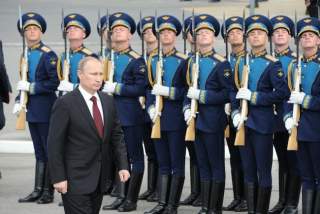What Is at Stake in Ukraine
A horrible civil war—with global ramifications.
Based on this reasoning, we can draw a very important conclusion.
If such a vision of American strategy is true, at the end of the day it makes no difference who rules Russia and what Russia’s viewpoint on the Ukraine crisis is. If U.S. strategy seeks to limit Russia’s sovereignty and subordinate it to Washington’s diktat, use Russia’s resources in the future collision with China and not allow any closer cooperation between Russia and China, then this strategy will continue no matter what compromises Russia is ready to make on the current stage of the Ukraine crisis. Obviously, Washington will not stop there. Sanctions will become more serious without any justification. It is always possible to find reasons to punish Russia, if one wishes to do so. That is why I think that even though the session of the Russian Security Council, held last week in Moscow disappointed many, as no sensational announcements were made, for me personally, the title of the session “Securing Russia’s Sovereignty and Territorial Integrity” was important and noteworthy. It means that Russian government understands the purpose of the U.S. strategy to limit the country's sovereignty as it was in 1990s, and to achieve this goal not through direct confrontation with Russia, but by way of some sort of color revolution. That is why I think that this session of the Security Council was a message to Washington, to indicate that their strategy is clear to Russia and that there will not be an easy victory. Russia is ready to defend its sovereignty and will not allow regime change. And this in its turn means that the stakes will become higher in the Ukraine crisis and its outcome of which will determine not only the future of the East and the South of Ukraine, but of Russia, U.S, Europe, China and the whole world.
In conclusion, I would like to reiterate the main point of this article.
Obviously, Washington may be ready to make compromises only under the threat of losing the whole or at least the significant part of Ukraine rather than due to Russian concerns resulting from the fear of even more severe sanctions. If Russia demonstrates any weakness or accommodation, the threat of new sanctions will not fade, but on the contrary, the scale of demands will increase.
Quite surprisingly, even among Russian liberals there are prudent people, who consider that the sanctions will not scare Russia or break its determination to continue its consistent policy on Ukraine. On the contrary, the sanctions will be regarded as an American attempt to crush Russia and will rally the people around the leader even more. As one of Russia’s prominent liberals who hasn’t lost touch with Russian soil, what is itself an exceptional case among Russian liberal circles, George Bovt writes in The Moscow Times (July 23, 2014), “The more the pressure the international community applies [on Russia – A.M.], the stronger the anti-Western sentiments will become and the higher Putin’s ratings will climb.” In this regard, he calls for the West to be sober: “There’s only one alternative: The West must urgently find a compromise on Ukraine question, recognizing that Russia’s and its interests cannot be pushed to the sidelines and that desire to deliver a humiliating defeat to Moscow can only intensify the conflict.” To call things by their names, Bovt admits in his article that the West will not defeat Russia with sanctions, and that such a policy can have serious consequences both for the West and even more so for the liberals and pro-Western circles in Russia.
Andranik Migranyan is the director of the Institute for Democracy and Cooperation in New York, which works closely with the Russian Presidential administration.
Image: Kremlin website

